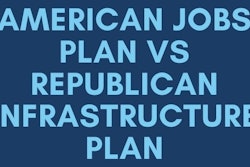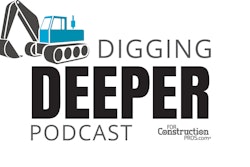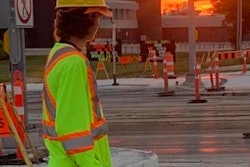
The Problem Solvers Caucus Infrastructure Working Group was created to analyze policies and find points of bipartisan consensus to address the enormous need for new infrastructure and the current backlog of deferred maintenance facing our country. The Working Group explored issues including but not limited to our highways, roads and bridges, transit and railways, ports and airports, water and sewer systems, energy systems and the power grid, and broadband and communications networks.
Recently, the group released a new report of bipartisan policy recommendations to build a strong, successful 21st Century infrastructure network for America.
The report, Rebuilding America's Infrastructure, was officially endorsed by the 58-Member bipartisan Caucus — equally divided between Democrats and Republicans, led by Co-Chairs Josh Gottheimer (NJ-5) and Brian Fitzpatrick (PA-1). To receive an endorsement, 75 percent of the Members must support it.
The report puts forward a set of policies to serve as a bipartisan framework for addressing the dire need to rebuild and responsibly invest in infrastructure across the nation. It details bipartisan policy solutions that will improve the country’s highways, roads and bridges, transit and railways, ports and airports, water and sewer systems, energy systems and the power grid, and broadband and communications networks.
The report also helps define the scope of a bipartisan agreement on a transportation and infrastructure plan.
"By modernizing existing user fees, incentivizing private innovation and investment through public-private partnerships, making smarter investments with limited federal dollars, equipping our infrastructure and transportation systems to be more resilient in the face of climate change and natural disasters, and increasing accountability to taxpayers; this task force believes we can build a 21st Century infrastructure network that will foster a truly 21st Century economy that works for every single American," the report says.
Surface Transportation a Priority
America's network of surface transportation infrastructure has given our country a major economic, competitive advantage in a global economy. Unfortunately, Congress has allowed a backlog of deferred maintenance to grow in our existing infrastructure while failing to keep up with increasing demand. This has made it harder for businesses to compete, caused workers and families to spend more time stuck in traffic each day and left much of our infrastructure crumbling and unsafe.
Historically, the federal government has paid its share through the Highway Trust Fund, which is funded primarily through the federal user fee on gasoline. However, in 2008, spending exceeded declining revenue in the fund for the first time since its inception in 1956. This is primarily due to the following three factors:
- The 18.4 cents-per-gallon user fee on gasoline has not been increased since 1993.
- The user fee on gasoline is not indexed to factors including fuel economy standards, construction costs, or inflation, resulting in a user fee with a purchasing power worth 40 percent less than its value in 1993.
- Technological innovations and federal fuel economy regulations have made vehicles far more efficient, resulting in further revenue reductions for the trust fund.
As a result, Congress has been supplementing the trust fund since 2008 to the tune of $157 billion through significant transfers from the U.S. Treasury general fund and transfers from other federal funds. This spending puts the burden of today's infrastructure needs on tomorrow's children. Lawmakers must stop kicking the can down the road.
The Problem Solvers Caucus offered up these solutions to the problem.
- Ensure sustainable and long-term funding for the Highway Trust Fund by modernizing the current federal user fee system and providing proper tools so that the American people do not face the same funding shortfalls over the next 25 years. This could be done in a number of ways, including but not limited to:
- An immediate adjustment in calendar years after 2021 to the rates of the excise taxes on petroleum and petroleum products, diesel fuel, alcohol-based fuel, and fuels used in certain buses, by indexing them to anyone (or some combination) of the following:
- Inflation or the Consumer Price Index
- National Highway Construction Cost Index
- Corporate Average Fuel Economy (CAFE) standards
- An immediate or phased in modernization of the federal gasoline user fee that fully and sustainably funds the Highway Trust Fund and provides accountability to taxpayers by stopping future general fund transfers.
- Incentivizing the transition to a vehicle miles traveled (VMT) program by supporting additional VMT pilot projects and assessing the functionality of and public reaction to these programs. Congress should also consider creating a pilot project to implement a mileage-based user fee on fully automated vehicles.
- Alternative user fees that take into account changes in technology and mobility use, and equitably distribute the costs of maintaining and constructing transportation infrastructure, should be considered. These include but are not limited to:
- A modest annual registration fee on fully electric and hybrid electric vehicles, which currently either contribute nothing or contribute significantly less to the Highway Trust Fund than gasoline-powered vehicles.
- A user fee based on the value of freight assessed through waybill taxes, broadening the current air cargo tax to trucking services
Industry Applauds Bipartisan Efforts
America's infrastructure supports the world's largest economy across a network of over 4 million miles of roadway, 160,000 public water systems, 5.5 million miles of local electrical distribution lines, and over 100 million fixed broadband subscribers. Regardless of how infrastructure is addressed, the industry knows it needs to be addressed immediately in order for our economy to grow.
The Association of Equipment Manufacturers (AEM) senior vice president of government and industry relations Kip Eideberg issued the following statement applauding the Problem Solvers Caucus on its new report:
“Americans are ready for a transformational investment in our nation’s infrastructure so we can grow our economy, improve our quality of life, and protect our environment for the generations to follow," said Eideberg. "The Association of Equipment Manufacturers applauds the 58 Republicans and Democratic members of the Problem Solvers Caucus for putting forward a set of bipartisan and commonsense policy solutions that will address today’s challenges and capture future opportunities. President Biden’s American Jobs Plan, bipartisan support in Congress for a surface transportation reauthorization bill, and today’s unveiling of the Rebuilding America’s Infrastructure Report for the 117th Congress by the Problem Solvers Caucus, point to growing momentum for a modern, sustainable, and equitable infrastructure for all Americans. We urge the business community and policymakers to put policy ahead of politics and to work together to embrace and advance an affirmative vision for 21st century infrastructure and break free from the same old policies that have failed to move our country forward.”




















